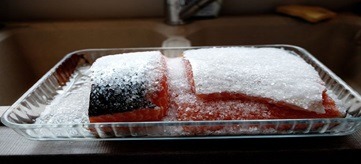Freezing is the least time-consuming, easiest, and most convenient way of food preservation. Freezing prevents food wastage and also enables you to store foods till they are needed for consumption. When you cook an extra meal that is not needed for immediate consumption, freezing it is the best way to make it remain edible and fresh. With a good freezer, you do not need to frequent the grocery and food store as you can buy a large volume of food items and store them in a deep freeze for fast and convenient preparation. Freezing it is an amazing and safe way of preserving food item as it prevents the use of chemical preservatives and their side effects.
However, most people do not understand what the rules are when it comes to food freezing for preservation. It is important to note that not every food item can be placed in the freezer. Some food preserves well by freezing, while others, such as cream-based items, products with high water content, and other cooked starchy food (noodle and rice), do not accept freezing under any circumstances. It would help to bear in mind that you will have to prepare some foods before putting them in the deep freeze, while some are best preserved raw.
Foods That You Can Freeze
Seafood, Meat, And Poultry
The best way to preserve these foods is by freezing. Wrap them in a freezer paper or plastic wrap followed by an additional layer of foil. This is to ensure that the item is not exposed to air which causes freezer burn. Although freezer burn is not dangerous to the health, it negatively affects the appearance, texture, and taste of the food. The seafood, meat, and poultry foods you can freeze include fish, chicken, beef, hotdog, bacon, crab, turkey, and shrimp. It also includes wild games such as squirrel, rabbit, duck etc.
Dairy Foods
Some of these products need preparation before freezing them, while some should be frozen raw. Diary items that you can freeze include cottage cheese, milk, butter, raw eggs, whipped cream, whole egg, and many others. You need to follow the right freezing process to achieve a desirable result, like the whole egg has steps that must be followed to freezing it.
Other Food Products
You can freeze most products for preservation except a few, which may not freeze well. Some of the products you can freeze are carrot, cheese, potato, onion, peas, okra, pumpkin, broccoli, mango mushroom, asparagus, sweet potatoes, and many others.
Foods That You Should Not Freeze
- Vegetables with high water content such as cucumber, lettuce, radish, and bean sprouts. These items go limp and mushy
- Egg-based sauces such as mayonnaise separate and cuddle in the freezer
- Cooked egg whites
- Gallatin
- Sour cream
- Fully cooked starchy food such as rice and noodle
- Hard-boiled eggs go rubbery
- Deep-fried foods become soggy
Freezing helps store food for a very long time, and following the proper freezing methods help retain the color, freshness, taste, and texture of any food. Storing food items in a freezer saves time and also makes food shopping a lot easier.
